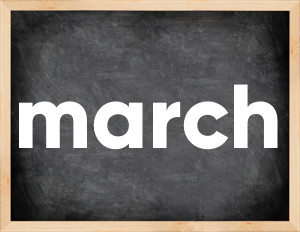 The English verb 'march' is pronounced as [mɑːrtʃ].
The English verb 'march' is pronounced as [mɑːrtʃ].
Related to:
regular verbs.
3 forms of verb march: Infinitive (march), Past Simple - (marched), Past Participle - (marched).
Here are the past tense forms of the verb march
👉 Forms of verb march in future and past simple and past participle.
❓ What is the past tense of march.
March: Past, Present, and Participle Forms
| Base Form | Past Simple | Past Participle |
|---|---|---|
| march [mɑːrtʃ] |
marched [mɑːtʃt] |
marched [mɑːtʃt] |
What are the 2nd and 3rd forms of the verb march?
🎓 What are the past simple, future simple, present perfect, past perfect, and future perfect forms of the base form (infinitive) 'march'?
Learn the three forms of the English verb 'march'
- the first form (V1) is 'march' used in present simple and future simple tenses.
- the second form (V2) is 'marched' used in past simple tense.
- the third form (V3) is 'marched' used in present perfect and past perfect tenses.
What are the past tense and past participle of march?
The past tense and past participle of march are: march in past simple is marched, and past participle is marched.
What is the past tense of march?
The past tense of the verb "march" is "marched", and the past participle is "marched".
Verb Tenses
Past simple — march in past simple marched
(V2).
Future simple — march in future simple is march (will + V1).
Present Perfect — march in present perfect tense is
marched
(have/has + V3).
Past Perfect — march in past perfect tense is
marched
(had + V3).
march regular or irregular verb?
👉 Is 'march' a regular or irregular verb? The verb 'march' is regular verb.
Examples of Verb march in Sentences
- We just have to march along these two streets (Present Simple)
- We marched in the ruined Novgorod (Past Simple)
- He was marching under the protection of soldiers. (Past Continuous)
- The military marched slowly down the street. (Past Simple)
- The children were too noisy and I marched them off to bed. (Past Simple)
- He ordered them to turn left and marched them in a long column to the west. (Past Simple)
- After this, events marched rapidly. (Past Simple)
- The soldiers will soon march across the border. (Future Simple)
- The protesters have marched near the entrance to the American embassy. (Present Perfect)
- He pushed him aside and marched into the chief's office. (Past Simple)